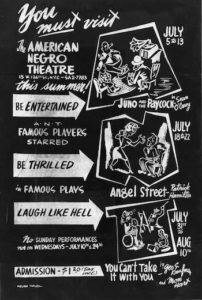
ANT Poster
On this date in 1940, The American Negro Theater (ANT) was organized in Harlem, New York. Coordinators were Frederick O’Neal, Abram Hill, and members of the McClendon Players.
ANT was a pioneering African American theater company and school where several hundred Black actors, writers, and technicians began their careers. The Academy's Award-winning actors Sidney Poitier and Ruby Dee and actor and singer Harry Belafonte are three of the prominent Blacks who were affiliated with the American Negro Theater. The theater was founded in Harlem by the Black writer Abram Hill and the Black actor Frederick O'Neal, who sought to create a company that would provide opportunities for African American artists and entertainment for African American audiences, which were unavailable downtown on Broadway.
Over the next nine years, 50,000 people attended ANT productions. Hill and O'Neal believed that the mainstream professional theater offered only limited opportunities for African Americans and fostered a "star system," under which actors constantly competed to achieve the breakthrough hit. Hill and O'Neal were more interested in the potential for local Black community theaters, where directors, writers, and technicians would be as important as actors would be and where Black artists would be able to develop their talents. They sent postcards inviting other local writers and actors to join them, and in June of 1940, 18 artists met to form the American Negro Theater.
These members' stated mission was "to break down the barriers of Black participation in the theater; to portray Negro life as they honestly saw it; [and] to fill the gap of a Black theater which did not exist.” The company emphasized a cooperative spirit and chose the name in part for its acronym, ANT. Members wanted the abbreviation to signify that, like ants, they would all be true workers. ANT was also a financial cooperative: members shared expenses or profits, and those members who performed outside ANT were required to deposit two percent of their salaries into ANT's account. Until the company received a $22,500 Rockefeller grant in 1944, no one received a salary, but the financial arrangements symbolized the members' commitment to the company. ANT was not intended to be a segregated organization, although its members were dedicated to creating a theater that reflected the Harlem community.
Most of the original members were Black actors and writers. Performances were held in a converted lecture room at Harlem's 135th Street Library, which seated 125 people and had been used by several earlier Black theater groups. As the playwright and novelist Alice Childress said, "We thought we were Harlem's theater." The company's first major production was Abram Hill's On Strivers' Row, a satire on African American social climbing. It was well-reviewed and well-attended and described by one critic as "a healthy experimental theater, one that at all costs strives to avoid conventional Broadway-bound clichés. It remains firmly on the ground, using themes about everyday people, staged and played with originality and imagination."
In 1942, ANT added its Studio Theater, a training program for young artists. Poitier and Belafonte, two of the Studio Theater's early graduates, became internationally known actors. Between 1940 and 1949, ANT produced 19 plays, including 12 original scripts. But its 1944 production of Anna Lucasta, by the white author Philip Yordan, proved to be a turning point. The play was originally written about a Polish-American family, but after white companies rejected it, ANT revised it and made it suitable for a black cast. It was an immediate success, and after five weeks, it was moved to Broadway.
What should have been a tremendous achievement for ANT, however, instead brought problems. The production ran for two years on Broadway and eventually generated a national tour and a movie, but ANT received royalties of less than two percent for the Broadway show and none at all for the tour or the film. The unfavorable financial arrangements understandably caused bitterness among company members. More importantly, however, the production undermined some of ANT's initial conceptions of itself as a community theater. When Anna Lucasta went to Broadway, the new production retained only a few actors from the original ANT.
Despite ANT's hope of providing an alternative to the professional star system, the Broadway connection revived old grievances: actors who had not been chosen to go to Broadway were bitter, and new actors came to the ANT seeking their chance to make it to the Broadway stage. The success of Anna Lucasta also brought about a new level of professional attention, and the company felt compelled to respond by changing the aim of its productions. Instead of continuing to encourage community-based writers, ANT, after 1945, produced only plays by established white playwrights. As a result of these changes, ANT lost much of the creativity and community support that had sustained it. The company did send three more productions to Broadway, but none were financially successful.
In 1945, ANT became the first Black Theater Company to produce a weekly radio series, but the radio show's success did not lessen the theater's difficulties. By the early 1950s, production had stopped. Despite its eventual decline, ANT had played a crucial role in raising awareness of Black theater within the broader American theater scene. As the playwright Lofton Mitchell later put it, "There was a great social revolution underway, the plays of protest, the plays of social meaning, and this was the kind of theater we were trying to develop. We were trying to say something. We were trying to say it within the black media, with the rhythm and quality of excitement."
A Pictorial History of Black Americans
by Langston Hughes, Milton Meltzer & L. Eric Lincoln
Copyright 1956, Crown Publishers, N.Y.
ISBN 0-517-55072-5